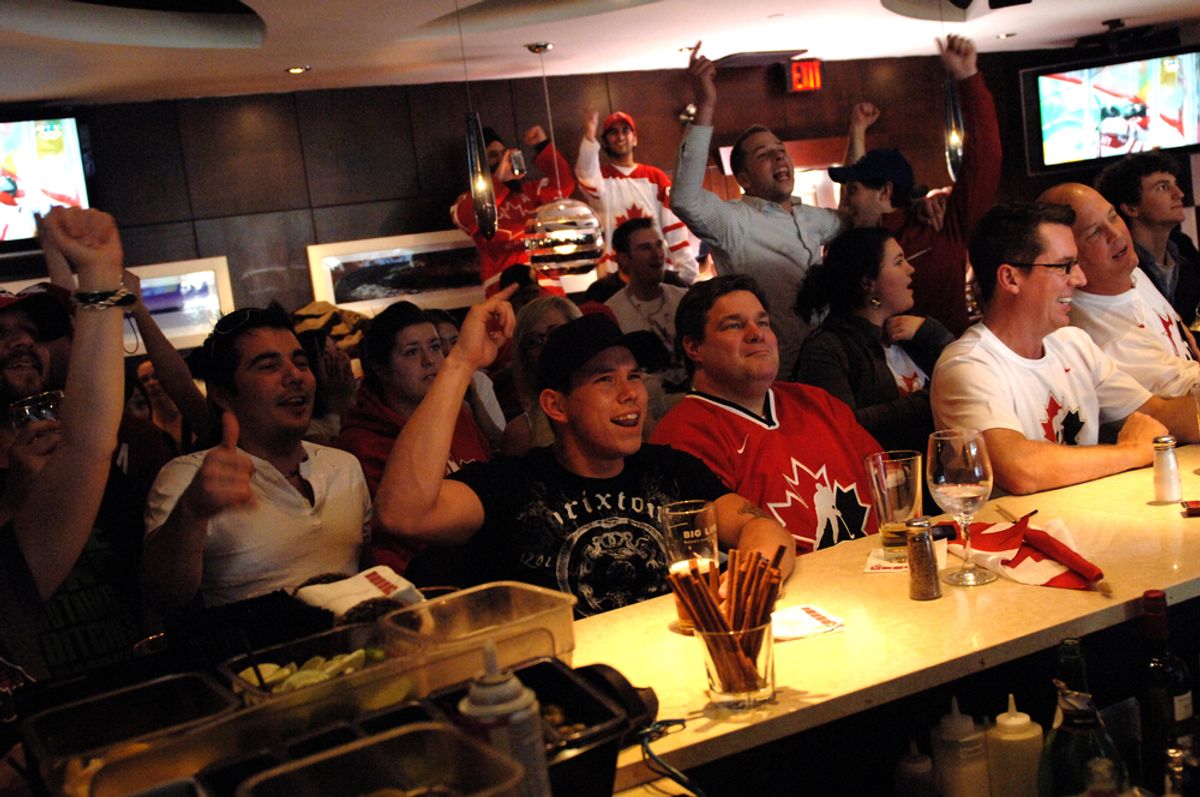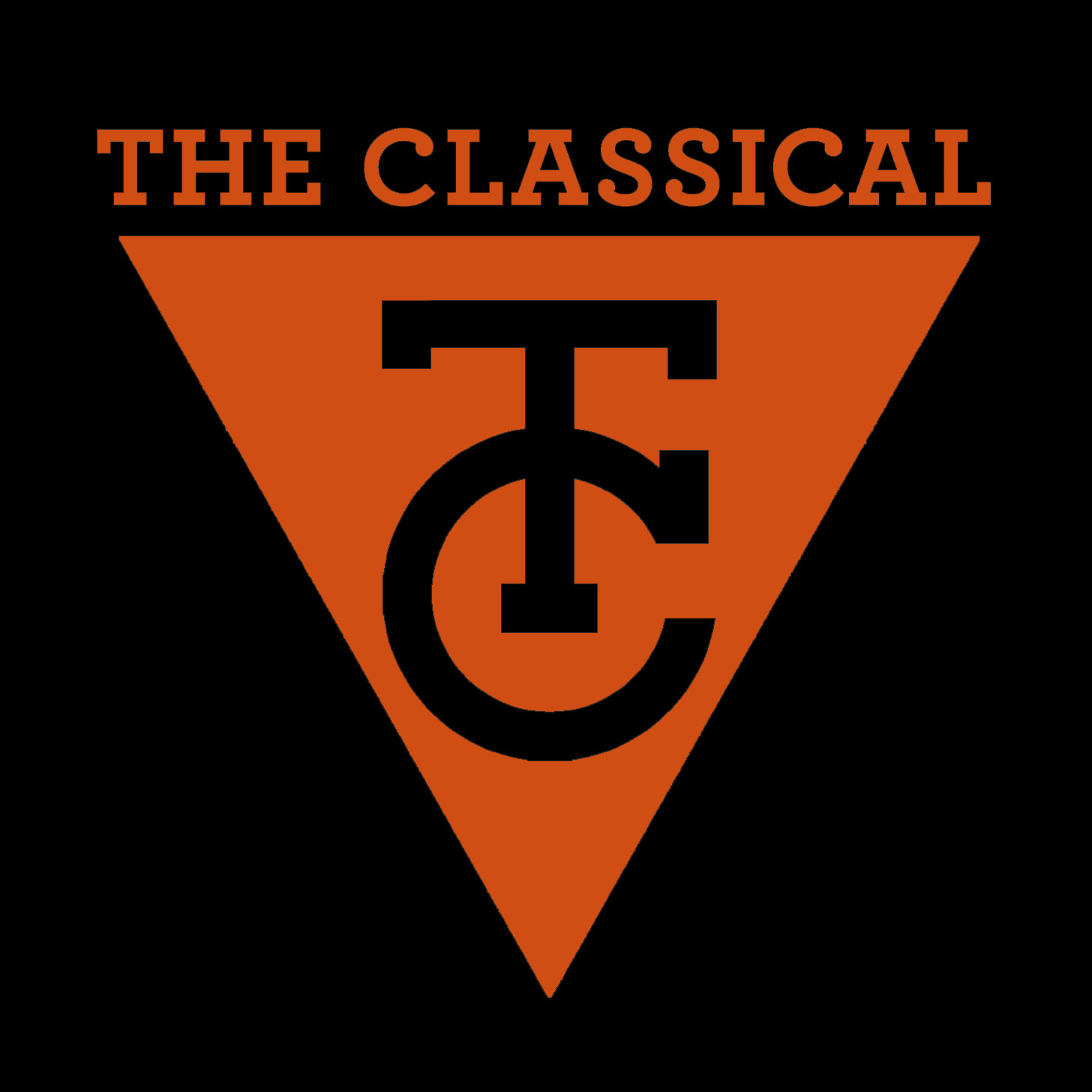The latest issue of The Classical Magazine -- which you can get here -- is built around the idea of Being There, and of how sports we experience sports in the various places we experience them. This is part of an occasional series along that theme.
Sports does something to us. Some things, really -- turning us weird and wild-eyed in the moment, picking us up on sudden surges of partisanship and then dropping us off someplace higher or lower than where we started. The games happen in stadiums and arenas and domes, but where these moments happen for most of us, or at least have happened for me, is a different location, one whose traits vary from place to place but not so much.
This is a grimy and maybe grim place lit by flat-screen TVs humming in the key of SportsCenter. Sticky film from spilled drinks probably covers the floor. The air, once thick with cigarette smoke, now is tinged with the spicy tang of chicken wings cooling on plates. It's a sports bar. It's always a sports bar.
These aren't perfect. They aren't always fun or clean or up to the standards of relevant local health codes. On a busy night, chances are they aren't quite following the fire marshal's orders. You will regret certain drinks in the morning, and, depending on the quality of liquor on the rail, might regret them instantly. You will regret the food next time you see a doctor or step on a scale or even stand up. You might wonder why you didn't just stay home, where it's never crowded and the beer is better and the bathroom less horrifying and you can choose who sits next to you.
Yet the sports bar is seldom deserted. There is a need and a place for it, so there it is, open and never empty.
Never empty doesn’t always equal popularity. The sports bar might not be your favorite place. In an era of rising ticket prices, rising parking fees and shrinking paychecks, even a place with $6 Buds is a cheaper alternative to ballpark camaraderie. It’s also probably a much closer drive, if you have to drive at all. Admission is free; the foremost class difference is not between a luxury-boxed elite and everyone else, but between the kind of person who prefers a stool to the patron who rathers a booth.
Even people who can't stand these places somehow end up at one, especially for big games. How do I know this? The same way you do, probably. I run into them at sports bars.
***
Where we gather is important because being a sports fan is communal. We join fan bases without even knowing it and often are born into our various tribes, groups to call our own. This is strange, this random bit of birthright citizenship, but it gives us a reason to connect with what would otherwise be total strangers. It gives us instant entry into various conversations, which might be glib but almost always welcome.
Over time, our teams become extensions of ourselves. We say “we won” and “we failed.” Our co-tribemates become our cohabitants in our sort-of-chosen communities. We sing together. We dress alike. We always wear the same colors. Being together, win or lose, is as much a part of being a fan as having a favorite player or booing your enemy.
So it seems meaningful and a little sad that, given how important gathering is to sport itself, the ability to do that at a stadium has gotten only more difficult to manage financially. The Fan Cost Experience estimates how much fans pay to attend live games. Their research found that the average cost of a ticket to a regular-season MLB game in April was $27.48. The average ticket for a regular-season NFL game in September 2012 came in at $78.38. NBA fans saw little relief. Their average ticket price in November 2012 was $50.99.
And that’s only the ticket, not the hyper-inflated costs of parking and food and drink. And there is, moreover, the emotional cost of spending an hour, maybe more, driving to the stadium, navigating snarled game-day traffic, mumbling at our tribemates to remember how a freaking merge works. All this assumes you want to see a regular-season game in the cheap seats. Anything special -- playoffs or a tournament or even a mid-season game against a rival -- will cost much more.
So, essentially, the cost of all this is being trapped. It’s a good kind of trapped if the team wins and you find yourself surrounded by like-minded, giddy individuals. Nobody cares, then, about being confined to the stadium and to marked-up, stadium-approved beers in riot-proof plastic bottles. It's nothing to say “excuse me” ten times while pushing and smushing through people to get to the bathroom, or to say another ten “excuse me”’s on the way back. If things work out right, this is part of the show, something that's worth the significant price of admission.
Of course, if the team loses, you’re still there. There's the slow, shameful trudge out of the stadium after losing. There's everything else, which is the same as everything above, but feels notably different.
***
There are different types of sports bar in different places, but they tend to follow very specific, if entirely unwritten, rules. The walls will be covered in sports memorabilia, generally with very little connection between pieces except that they all are part of sports and reflect some rooting interest. There will be lots of beer -- sometimes good ones on tap, and sometimes familiar ones in bottles -- and even more TVs. There will be booths and, of course, a bar. These are the basics.
For the most part, too, the place will have the dark hush of night in the middle of the day and thump with brightness and energy in the dead of night. Music will play, and everyone will ignore it.
It will carry, to an extent, the air of a tree house. A place where everything becomes a game or a gamble, strangers become temporary best friends and the only rule is this better be fun. So: a boozy Neverland for grownups with close-captioned SportsCenter looping through the lulls.
Change cities, change jobs, get married, have a child, divorce and remarry. At no point will any of those things preclude anyone at a bar from accepting you as a Vikings fan or a Dodgers die-hard or a Penguins aficionado—this is a space in which you are who you say you are. In an era where so much feels unstable, our sports identity is not, unless we change our minds, renounce citizenship. That means we always will have a home of sorts, if often a loud, greasy and dim one, in our bar of choice, in whatever clearing our tribe chooses or whatever clearing chooses our tribe.
There are choices. In 2007, the U.S. Census estimated that the United States was home to 46,924 "drinking places." Throw in places that thrive on a mix of food and drinks, and that Census number climbs to 571,621.
For the big game, they will be full. After Landon Donovan scored the winning goal in the U.S. men’s national soccer team’s defeat of Algeria -- sending the Yanks into the next round of the 2010 World Cup -- a compilation video of Americans celebrating quickly went viral. For more than five minutes, as inspirational music swelled in the background, fans across the world hugged, screamed, jumped up and down, waved flags and chanted U-S-A, U-S-A! It has more than four million views. Almost every clip -- from New York to California to Europe -- shows fans gathered in sports bars.
***
My strongest sports bar memory comes from the night the Miami Heat won the Eastern Conference in 2006. I was a Miami Herald reporter out getting "fan reaction." This is not nearly as enjoyable as covering the game, but possibly as rewarding.
My assignment that night was the Pembroke Pines Ale House, a typical suburban sports bar in the shadow of a mall. One of its signature sandwiches, predictably, featured spicy fried chicken breast. It served buckets of beer, pitchers of beer and the occasional mixed drink. Every TV showed the Heat, and people packed in.
Fans who could squeeze in found their spots; the ones who didn't fit stood outside, close enough to hear the action. Everyone was a Heat fan, and any personal space was forgotten. Hearing the game was nearly impossible. The only thing harder to do was move. Seeing the action on the TVs wasn't necessary. The various shades of oohhhs and uuuggghhhhs told the game’s story.
I shuffled through the crowd, trying to get quotes from people. It was a lot like a cheesy advertisement, except true -- the fans packed inside all had different jobs, different backgrounds, different homes and somehow all chose from those various starting points to spend an evening mashed together for this moment.
But this wasn't a place for interviewing. Frustrated, I went outside, where there was a bit more room to move and a slightly better chance to hear what people said. The moment the Heat won the championship a gigantic roar emerged from the bar, every voice all together once the clock hit zero. It felt like an audio flare, telling everyone who could hear that the Heat had won and we should celebrate right here and right now. Everyone listened, everyone agreed, and everyone celebrated.
Only a few blocks away, all was silent. The suburbs were asleep, and I drove through a vast, dark, slumbering stretch on my way back to the office. If ever a sports bar was a bubble dream world, putting off adulthood one night longer, it was that night. The quick transition from euphoria to the emptied-out everything else was what sticks.
***
I still think about that moment, when people mock those who leave Heat games early, or when Rembert Browne writes about his realization that the true Heat fans were not the high rollers in the pricey seats but the arena staff, watching from the sides, their hopes rising and falling with every basket. I think about it when I remember how the Pines Ale House exploded, and people partied like they were the high rollers, because they'd decided the Heat win belonged to them.
I've been thinking, in writing this, about where we watch. Which for the most part is not the luxury boxes, or even the cheaper upper bowls, so far from the field of play that most of the action is relayed to fans on giant screens. It is, for all but the VIPs and the boosters and the elite, definitely not at the pricey after-parties. We watch where we can -- on a TV on breaks, or at a friend's home, or at the place that stands in most closely and most affordably for the place we want to be. No one really talks about loving sports bars, but it's where we go. It's where we are, and so we go there.
Diana Moskovitz is a freelance writer and lifelong follower of Pittsburgh sports. She's on Twitter at@DianaMoskovitz and displays a Jerome Bettis bobblehead in her home.




Shares